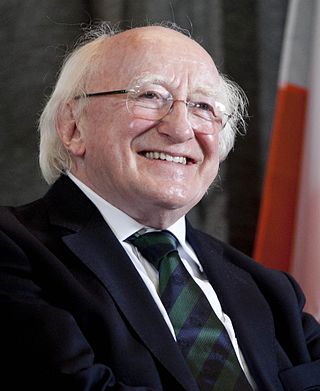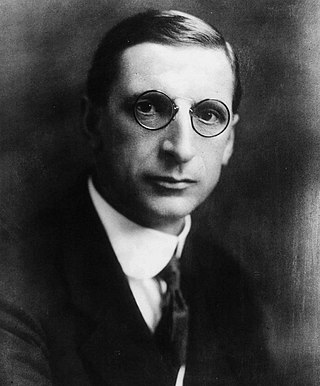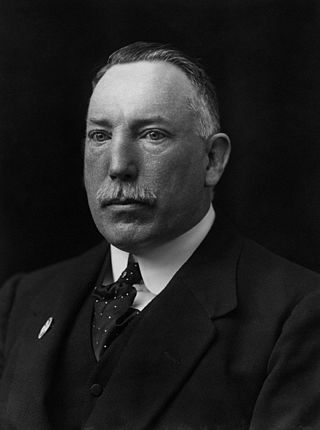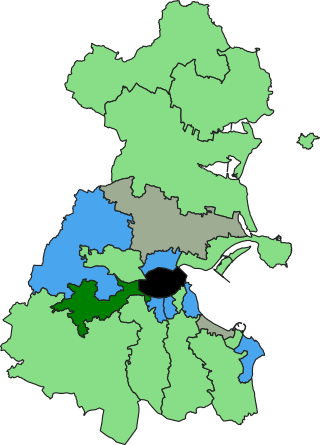Results by party
| Party | Seats | ± | Votes | % | ±% | |
|---|---|---|---|---|---|---|
| Incumbents re-elect | 9 | 10,574 | 52.42 | |||
| Ratepayers | 5 | 7,622 | 37.79 | |||
| Independent | 1 | 1,976 | 9.79 | |||
| Totals | 15 | 20,172 | 100.00 | — | ||
Elections to the Pembroke Urban District Council took place on Monday 16 January 1899 as part of that year's Irish local elections.
Unlike some of the elections elsewhere in Ireland, the election was not explicitly contested on Nationalist/Unionist grounds. Instead, the election largely saw a new group of 'Ratepayers' candidates, together with several Independents, challenge the incumbent Town Commissioners on their historic administration of the district. [1]
The result saw Nationalists elected to the council for the first time. [2]
Following the election Sir Robert Jackson was elected Chairman, replacing Col. Davoren. [3]
| Party | Seats | ± | Votes | % | ±% | |
|---|---|---|---|---|---|---|
| Incumbents re-elect | 9 | 10,574 | 52.42 | |||
| Ratepayers | 5 | 7,622 | 37.79 | |||
| Independent | 1 | 1,976 | 9.79 | |||
| Totals | 15 | 20,172 | 100.00 | — | ||
| Party | Candidate | Votes | % | ±% | |
|---|---|---|---|---|---|
| Sir Robert Jackson (incumbent) | 1,472 | ||||
| Ratepayers | John Coffey | 1,244 | |||
| Ratepayers | Michael Cooney | 1,134 | |||
| Ratepayers | John McBride, J.P. | 1,063 | |||
| Dr J Cranny (incumbent) | 1,012 | ||||
| Col. Vesey Davoren (incumbent) | 1,008 | ||||
| Independent | Samuel Worthington | 1,003 | |||
| George W. Casson (incumbent) | 949 | ||||
| Daniel L. Ramsay (incumbent) | 934 | ||||
| G O. Carolin (incumbent) | 918 | ||||
| John Mooney Jnr. (incumbent) | 846 | ||||
| Ratepayers | John King/Ring | 796 | |||
| Robert F. Lidwill (incumbent) | 794 | ||||
| Ratepayers | James Thomson | 730 | |||
| Cornelius de Groot (incumbent) | 714 | ||||
| Ratepayers | Michael Newport | 709 | |||
| Major John Gibbs (incumbent) | 686 | ||||
| John Gardner FCA (incumbent) | 680 | ||||
| Ratepayers | John Francis Murphy | 675 | |||
| Ratepayers | Francis Rooney | 642 | |||
| Ratepayers | Christopher Downey | 629 | |||
| Independent | George R Goodfellow | 624 | |||
| Arthur D. Pollen (incumbent) | 561 | ||||
| Independent | Loftus Lowcay Nuzum | 349 | |||
| Turnout | 20,172 | ||||

North Down is a parliamentary constituency in the United Kingdom House of Commons. The current MP is Stephen Farry of the Alliance Party. Farry was elected to the position in the 2019 general election, replacing the incumbent Sylvia Hermon. Hermon had held the position since being elected to it in the 2001 general election, but chose not to contest in 2019.
Abstentionism is the political practice of standing for election to a deliberative assembly while refusing to take up any seats won or otherwise participate in the assembly's business. Abstentionism differs from an election boycott in that abstentionists participate in the election itself. Abstentionism has been used by Irish republican political movements in the United Kingdom and Ireland since the early 19th century. It was also used by Hungarian and Czech nationalists in the Austrian Imperial Council in the 1860s.
Sinn Féin is the name of an Irish political party founded in 1905 by Arthur Griffith. It became a focus for various forms of Irish nationalism, especially Irish republicanism. After the Easter Rising in 1916, it grew in membership, with a reorganisation at its Ard Fheis in 1917. Its split in 1922 in response to the Anglo-Irish Treaty which led to the Irish Civil War and saw the origins of Fianna Fáil and Fine Gael, the two parties which have since dominated Irish politics. Another split in the remaining Sinn Féin organisation in the early years of the Troubles in 1970 led to the Sinn Féin of today, which is a republican, left-wing nationalist and secular party.
William Kenny PC (I), QC, was an Irish judge and Liberal Unionist politician.

The 2018 Irish presidential election took place on Friday, 26 October, between 7.00 a.m. and 10.00 p.m. President Michael D. Higgins, who was elected in 2011 with the support of the Labour Party, was seeking re-election to a second term as an Independent. This was the first time since the 1966 election that an incumbent president faced a contest for a second term. Higgins was re-elected on the first count with nearly 56% of the vote, becoming the first president since Éamon de Valera to win a second term in a contested election. He was inaugurated for his second term on 11 November.

Elections were held in January and June 1920 for the various county and district councils of Ireland. The elections were organised by the Dublin Castle administration under the law of the then United Kingdom of Great Britain and Ireland (UK), and held while the Irish War of Independence was pitting UK forces against those of the Irish Republic proclaimed in 1919 by the First Dáil. Elections were held in two stages: borough and urban district councils in January; and county and rural district councils in June. Sinn Féin, which had established the First Dáil, won control of many of the councils, which subsequently broke contact with Dublin Castle's Local Government Board for Ireland and instead recognised the republican Department of Local Government. The election results provide historians with a barometer of public opinion in what would be the last elections administered on an all-island basis: the Government of Ireland Act 1920 passed at the end of the year effected the partition of Ireland from 1921, though the elections for the two home rule Parliaments envisaged by it were held on the same day; No further elections would be held simultaneously across the island of Ireland until 1979, when representatives of the Republic of Ireland and Northern Ireland to the European Parliament were elected. The next local elections were held in 1924 in Northern Ireland and in 1925 in the Irish Free State.

John Cullinan was Irish Nationalist Member of the Parliament of the United Kingdom for Tipperary South, 1900–18.
The 1918 East Cavan by-election was a parliamentary by-election held for the United Kingdom House of Commons constituency of East Cavan on 20 June 1918. The election was caused by the death of the sitting member, Samuel Young of the Irish Parliamentary Party.

An election to Dublin Corporation took place in March 1899 as part of that year's Irish local elections.

The 1899 Irish local elections were the first local elections following the reorganisation of Irish local government caused by the Local Government (Ireland) Act 1898. The 1898 Act had changed the nature of Irish local governance, replacing the unrepresentative grand jury system, and making local government more democratic and representative. As a result, the 1899 election saw the traditional Unionist Landowning class, which had previously dominated much of Irish local politics, being replaced by a newer nationalist representation. Ulster's local government, however, remained Unionist in political outlook.

An election to Dublin Corporation took place in March 1902 as part of that year's Irish local elections. The election saw a small decline in Labour representation, whilst the Nationalists continued their dominance of the council.

The 1924 Northern Irish local elections were held in January & June 1924 for the various county & district councils of Northern Ireland. The election followed changes by the Unionist government, which had redrawn electoral districts, abolished PR for local elections, and implemented a requirement for members of local authorities to take an oath of allegiance.

Local elections were held in Northern Ireland on Thursday 2 May 2019. The last elections were held in 2014. 819 candidates contested 462 seats across Northern Ireland's 11 local government districts. 1,305,384 people aged 18 and over were eligible to vote, and 52.7% of the electorate turned out.
The 1920 Dublin County Council election was held on Monday, 7 June 1920.

The 1920 Antrim County Council election was held on Thursday, 3 June 1920.
The first election to Donegal County Council took place in April 1899 as part of that year's Irish local elections.

The 1899 Dublin County Council election was held on 6 April 1899. The election was peaceful, however rain prevented many voters from travelling to polling stations. The election was held alongside other local elections across Ireland.
The 1896 United Kingdom local elections took place in late 1896 for municipal councils, as well as Rural districts. Municipal elections were held across England and Wales on Monday 2 November, with Scotland holding municipal elections the following day. Municipal elections in Ireland took place later that month, on Wednesday 25 November.
Elections to the Kingstown Urban District Council took place on Monday 16 January 1899 as part of local elections that year. Following the election, T. W. Robinson was elected council Chairman.

The first election to Antrim County Council took place in April 1899 as part of that year's Irish local elections.